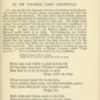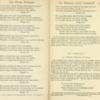A newe ballade made of Thomas Crumwel, called ‘Trolle on away’
Title
A newe ballade made of Thomas Crumwel, called ‘Trolle on away’
Synopsis
This song celebrates the beheading on Tower Hill on 28 July 1540 of Thomas Cromwell, Henry VIII's chief adviser. It is the earliest English execution ballad that can be reliably dated. The singer addresses Cromwell directly, mocking his rise from a low birth to the unprecedented heights he achieved.
Digital Object
Image notice
Full size image/s available at the bottom of this page.
Image / Audio Credit
Thomas Percy, Percy's reliques of ancient English poetry (London: Dent, 1910), 327-329. Audio recording by Jenni Hyde.
Set to tune of...
Transcription
Trolle on away, trolle on awaye,
Synge heave and howe rombelowe trolle on away.
Both man and chylde is glad to here tell
Of that false traytoure Thomas Crumwell,
Now that he is set to learne to spell.
Synge trolle on away.
When fortune lokyd the in thy face,
Thou haddest fayre tyme, but thou lackydyst grace;
Thy cofers with golde thou fyllydst a pace,
Synge, &c.
Both plate and chalys came to thy fyst,
Thou lockydst them vp where no man wyst,
Tyll in the kynges treasoure such things were myst.
Synge, &c.
Both crust and crumme came thorowe thy handes,
Thy marchaundyse sayled over the sandes,
Therfore nowe thou art layde fast in bandes.
Synge, &c.
Fyrste when Kynge Henry, God saue his grace!
Perceyud myschefe kyndlyd in thy face,
Then it was tyme to purchase the a place.
Synge, &c.
Hys grace was euer of gentyll nature,
Mouyd with petye, and made the hys seruyture;
But thou, as a wretche, suche thinges dyd procure.
Synge, &c.
Thou dyd not remembre, false heretyke,
One God, one fayth, and one kynge catholyke,
For thou hast bene so long a scysmatyke.
Synge, &c.
Thou woldyst not learne to knowe these thre;
But euer was full of iniquite:
Wherfore all this lande hathe ben troubled with the.
Synge, &c.
All they, that were of the new trycke,
Agaynst the churche thou baddest them stycke;
Wherfore nowe thou haste touchyd the quycke.
Synge, &c.
Bothe sacramentes and sacramentalles
Thou woldyst not suffre within thy walles;
Nor let vs praye for all chrysten soules.
Synge, &c.
Of what generacyon thou were no tonge can tell,
Whyther of Chayme, or Syschemell,
Or else sent vs from the deuyll of hell.
Synge, &c.
Thou woldest neuer to vertue applye,
But couetyd euer to clymme to hye,
And nowe haste thou trodden thy shoo awrye.
Synge, &c.
Who-so-euer dyd winne thou wolde not lose;
Wherfore all Englande doth hate the, as I suppose,
Bycause thou wast false to the redolent rose.
Synge, &c.
Thou myghtest have learned thy cloth to flocke
Upon thy gresy fullers stocke;
Wherfore lay downe thy heade vpon this blocke.
Synge, &c.
Yet saue that soule, that God hath bought,
And for thy carcas care thou nought,
Let it suffre payne, as it hath wrought.
Synge, &c.
God saue King Henry with all his power,
And Prynce Edwarde that goodly flowre,
With al hys lordes of great honoure.
Synge trolle on awaye, syng trolle on away.
Hevye and how rombelowe trolle on awaye.
Synge heave and howe rombelowe trolle on away.
Both man and chylde is glad to here tell
Of that false traytoure Thomas Crumwell,
Now that he is set to learne to spell.
Synge trolle on away.
When fortune lokyd the in thy face,
Thou haddest fayre tyme, but thou lackydyst grace;
Thy cofers with golde thou fyllydst a pace,
Synge, &c.
Both plate and chalys came to thy fyst,
Thou lockydst them vp where no man wyst,
Tyll in the kynges treasoure such things were myst.
Synge, &c.
Both crust and crumme came thorowe thy handes,
Thy marchaundyse sayled over the sandes,
Therfore nowe thou art layde fast in bandes.
Synge, &c.
Fyrste when Kynge Henry, God saue his grace!
Perceyud myschefe kyndlyd in thy face,
Then it was tyme to purchase the a place.
Synge, &c.
Hys grace was euer of gentyll nature,
Mouyd with petye, and made the hys seruyture;
But thou, as a wretche, suche thinges dyd procure.
Synge, &c.
Thou dyd not remembre, false heretyke,
One God, one fayth, and one kynge catholyke,
For thou hast bene so long a scysmatyke.
Synge, &c.
Thou woldyst not learne to knowe these thre;
But euer was full of iniquite:
Wherfore all this lande hathe ben troubled with the.
Synge, &c.
All they, that were of the new trycke,
Agaynst the churche thou baddest them stycke;
Wherfore nowe thou haste touchyd the quycke.
Synge, &c.
Bothe sacramentes and sacramentalles
Thou woldyst not suffre within thy walles;
Nor let vs praye for all chrysten soules.
Synge, &c.
Of what generacyon thou were no tonge can tell,
Whyther of Chayme, or Syschemell,
Or else sent vs from the deuyll of hell.
Synge, &c.
Thou woldest neuer to vertue applye,
But couetyd euer to clymme to hye,
And nowe haste thou trodden thy shoo awrye.
Synge, &c.
Who-so-euer dyd winne thou wolde not lose;
Wherfore all Englande doth hate the, as I suppose,
Bycause thou wast false to the redolent rose.
Synge, &c.
Thou myghtest have learned thy cloth to flocke
Upon thy gresy fullers stocke;
Wherfore lay downe thy heade vpon this blocke.
Synge, &c.
Yet saue that soule, that God hath bought,
And for thy carcas care thou nought,
Let it suffre payne, as it hath wrought.
Synge, &c.
God saue King Henry with all his power,
And Prynce Edwarde that goodly flowre,
With al hys lordes of great honoure.
Synge trolle on awaye, syng trolle on away.
Hevye and how rombelowe trolle on awaye.
Method of Punishment
beheading
Crime(s)
treason
Gender
Date
Execution Location
Tower Hill
Printing Location
Original in Antiquarian Society, in a large folio Collection of Proclamations, &c
Collection
Citation
“A newe ballade made of Thomas Crumwel, called ‘Trolle on away’,” Execution Ballads, accessed February 27, 2026, https://omeka.cloud.unimelb.edu.au/execution-ballads/items/show/1293.



